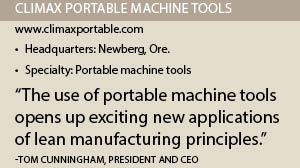Climax Portable Machine Tools
When giant institutions such as oil refineries, mines and power plants experience a mechanical breakdown, it can cost them millions of dollars per day. The broken piece of equipment – which can be the size of a bus – is traditionally transported to a machine shop to be fixed before being brought back again.
“This traditional stationary machining process is very time-consuming and expensive,” says Tom Cunningham, president and CEO of Climax Portable Machine Tools. “While the workpiece is being repaired, the system might be down, costing the customer thousands or millions of dollars a day in lost production.”
Based in Newberg, Ore., Climax specializes in portable machining, welding and advanced valve-testing systems. What makes this company unique is that it offers its customers a “portable” solution. The broken equipment is not transported to a machine shop. Climax brings the machine tool directly to the consumer.
“Our guy will get up and drive there with our equipment at 3 a.m. on a Saturday,” Cunningham says. “It’s those kinds of people who make a difference and save the customer millions of dollars.”
Portable machine tools – such as line boring bars, autobore welders, flange facers, mills, pipe cutters and bevelers – mount directly onto the workpiece and do the machining onsite. The same principles apply to the manufacture or production of cranes, ships, aircraft and turbines. Rather than moving the equipment around the factory to a stationary tools station, the portable tools are brought straight to the equipment.
 Lean Thinking
Lean Thinking
Using portable tools is often safer than the risks associated with transporting the workpiece around the factory or to another location, Cunningham says. In addition, portable tools enable a factory to apply lean manufacturing principles to increase safety, productivity, quality and to help reduce costs.
“The use of portable machine tools opens up exciting new applications of lean manufacturing principles,” Cunningham says. “Instead of trying to make your workpiece flow through a lean manufacturing line or cell, why not keep the workpiece stationary and use portable machine tools to make the lean manufacturing process flow around your workpiece instead?”
Cunningham notes that multiple portable tools can perform many operations on the equipment concurrently. “It’s faster, safer and more flexible, the results in the metal are better and it’s far more cost-effective,” he says.
Hands-Free Pioneers
Safety is becoming more important to companies, and Climax considers itself a safety pioneer. Almost all of Climax’s products have hands-free operation.
“There is a trend in our industry toward better safety practices and higher safety standards,” Cunningham says. “The typical cycle is that Climax introduces innovative new safety features, customers like them and they put pressure on our competitors to follow suit and then the features become the new industry standard. We loop through this cycle over and over, and we’re proud of that.”
Climax has long been a pioneer in hands-free operation of portable machine tools, meaning that users don’t need to place their hands near the moving parts of the machine tool while it is operating. The hands-free products use auto-feed features, remote controls and incorporate safety interlock systems. For example, if the machine suddenly loses power, the safety interlock prevents it from an abrupt restart when power returns. Sudden and unexpected re-starts have been known to cause injuries.
Many companies discourage the use of hand-operated machines if hands-free alternatives are available, Cunningham notes.
Safety Engineers
Climax launched a new generation of Calder valve-testing systems this year, a brand the company considers one of its highest achievements in safety engineering. The company says they are the most flexible and versatile systems on the market.
“Calder testers are engineered better than any other brand of testers to handle high pressures,” Cunningham says. “And they incorporate numerous safety features to help in protecting the user.” The Calder test systems are designed to provide the user with the lowest total cost of ownership and the highest return on investment over the life of the tester.
Climax, which celebrated its 50th anniversary last year, has manufacturing facilities in Newberg, Oregon, and in Wadsworth, Ohio. Ninety-eight percent of its products are manufactured at these two plants. By the end of this summer, the company expects that number to be at 100 percent as it finalizes consolidating all overseas manufacturing to its U.S. plants.
Though it takes great pride in its products, the company credits its employees with its success. “We compete with our products,” Cunningham says. “But we win with our people.”